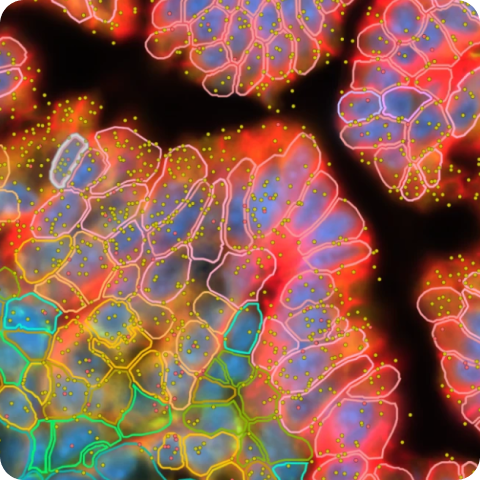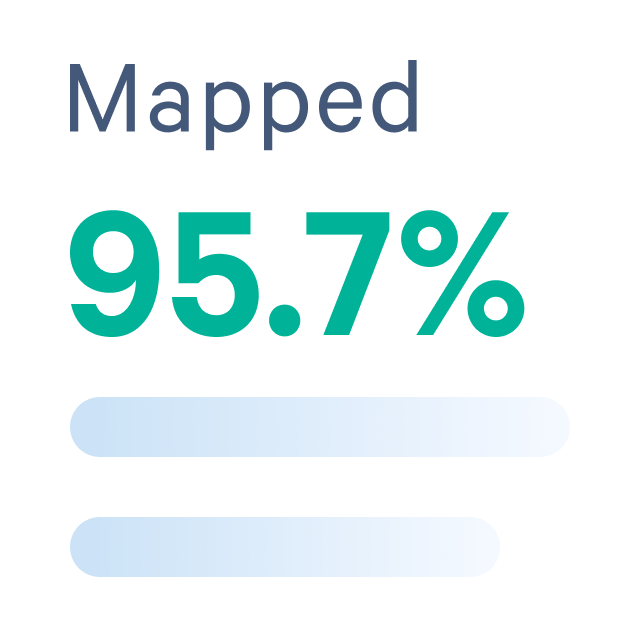Preview Data: FFPE Human Lymph Node with 5K Pan Tissue and Pathways Panel
In Situ Gene Expression dataset analyzed using Xenium Onboard Analysis 3.0.0

Learn about Xenium analysis
Overview
This dataset is a preview of the Xenium Prime solution using development versions of the Xenium Prime 5K Human Pan Tissue & Pathways Panel, assay user guide, and Xenium Onboard Analysis software.
How to view data
Interactively explore this dataset with the Xenium Explorer web demo ("Open web demo" above) or download the files to explore further on your desktop. Desktop Xenium Explorer v3.0 is required to view this dataset on your local computer - now available for download here.
See the Getting Started with Xenium Explorer page for general guidance navigating the web demo interface and these instructions to explore the aligned H&E image in the demo.
Biomaterials
FFPE-preserved tissues were purchased from Avaden Biosciences (Lymph Node, Left Axilla; Reactive Lymph Node).
Tissue preparation
Tissues were prepared following the Xenium In Situ for FFPE - Tissue Preparation Handbook (CG000578).
Probe hybridization, washing, ligation, amplification, and cell segmentation staining were performed following a development version of the Xenium Prime In Situ Gene Expression with optional Cell Segmentation Staining User Guide.
Post-instrument processing followed the Demonstrated Protocol Xenium In Situ Gene Expression - Post-Xenium Analyzer H&E Staining (CG000613).
Gene panels
The Xenium Prime 5K Human Pan Tissue and Pathways Panel was designed to enable comprehensive cell type and cell state identification using publicly available single cell RNA sequencing data. The panel also covers canonical signaling pathways, as well as genes relevant to developmental biology, immuno-oncology, and genes that are well known in biomedical literature.
A development version of the Xenium Human 5K Pan Tissue and Pathways Panel that targets 4,624 genes was used to generate this preview dataset. An additional 377 genes are targeted in the final version of the panel.
Xenium Analyzer
The instrument run was performed following the Xenium Analyzer User Guide CG000584. The on-instrument analysis was run with a development version of Xenium Onboard Analysis v3.0.0.
| Metric | Lymph node |
|---|---|
| Median transcripts per cell | 255 |
| Cells detected | 708,983 |
| Nuclear transcripts per 100 µm² | 730.8 |
| High quality decoded transcripts detected | 202,153,544 |
| Region area (µm²) | 47,977,579.9 |
Custom cell groups
Cells were assigned putative cell type labels based on label transfer from publicly available single cell RNA-seq data from CELLxGENE. See the Annotating Cell Types in Xenium In Situ Data with Label Transfer Analysis Guide to learn how to perform label transfer, including considerations for selecting single cell references.
We have provided these annotations to facilitate exploration of the data, however they are not guaranteed to yield publication-quality results. The label transfer method is limited by the accuracy and granularity of the annotations in the underlying single cell data. It is important to check that results reflect expected biology. For example, in this dataset, the label transfer method misannotated a cluster of putative MARCO+ macrophage cells as endothelial cells.
Custom gene groups
We used Seurat's FindAllMarkers to identify the topmost differentially expressed markers for each labeled cell type. From these, we only include positive markers which are statistically significant at an FDR of 0.05, expressed in at least 5% of their marked cell type, and exhibit at least a 2-fold change in expression compared to the other cell types.
Pathology Annotations
Pathology annotations can be imported in GeoJSON format in Xenium Explorer v4.1 and later (see Annotation Layer documentation for details). The supplemental GeoJSON annotation file is aligned to the post-Xenium H&E image.
This dataset is licensed under the Creative Commons Attribution 4.0 International (CC BY 4.0) license. 10x citation guidelines available here.
